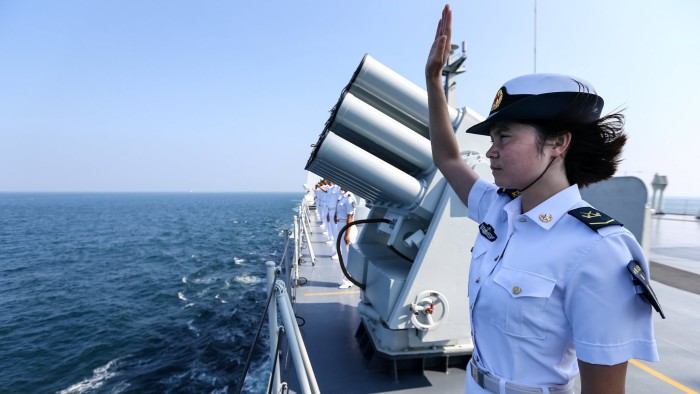Daily briefing: China’s Baltic drills, Jimmy Choo bid, children of complacency

Simply sign up to the Global Economy myFT Digest -- delivered directly to your inbox.
Sign up to receive FirstFT by email here
Chinese warships started exercises in the Baltic Sea for the first time on Tuesday, conducting a joint drill with Russia in a further sign of how the two countries are expanding their global reach through ever-closer military co-operation. The Baltic states and Poland are unsettled by Russia, which they accuse of regular military provocation close to their borders, conducting exercises on their doorstep alongside a quasi-ally.
It also emerged that a US spy plane was forced to take action to avoid a collision on Sunday when a Chinese fighter jet appeared in front of the navy aircraft as it flew over the East China Sea, according to the Pentagon. The US has been flying more missions over the East China Sea and the Korean peninsula to send a strong signal to North Korea and its autocratic leader Kim Jong Un. (FT)
In the news
Google fine weighs on results
Alphabet had its worst year-on-year fall in profits since the 2008 financial crisis. The parent company of Google reported its income fell more than a quarter after it was hit by the European Commission with a $2.7bn fine for abusing market dominance. It is exploring more personalised search options. (FT, Mashable)

Kushner denies Moscow collusion
Jared Kushner, the president’s son-in-law and top White House aide, denied colluding with Moscow as he sought to explain his meetings with Russian officials as part of the FBI investigation that is engulfing President Donald Trump’s administration. Here’s why Mr Kushner is a central piece in the Trump-Russia puzzle, and conservative writer Jennifer Rubin on how he is, at the very least, in over his head. (FT, WaPo)
HNA opens up
The sprawling Chinese conglomerate has admitted its official shareholding did not reflect its true ownership. Adam Tan, the chief executive, told the FT the mystery shareholder Guan Jun no longer holds shares in the company. (FT)

UK to tighten foreign investment reviews
The British government is pressing ahead with plans to tighten screening of foreign investments by China and other countries amid concerns that such flows could compromise national security. Separately, Australia has warned the UK against introducing a tougher visa regime after Brexit. (FT)
Michael Kors buys Jimmy Choo
Michael Kors is to pay £896m for the shoemaker, offsetting slower growth for luxury handbags. Jimmy Choo has itself been hobbling to keep up with its status in the early 2000s and discounting in US department stores. (FT, WSJ)
The day ahead
Macron the negotiator
French President Emmanuel Macron will meet the head of Libya’s United Nations-backed government and the North African oil producer’s powerful eastern-based military commander in the latest attempt to seek a solution to their stand-off. (Bloomberg)
US healthcare vote
The Senate is expected to vote on a major healthcare overhaul backed by Republicans — though few even in the GOP know what is in the bill that most plan to vote for, which could strip more than 20m people of their health insurance. (WSJ)
Keep up with the important business, economic and political stories in the coming days with the FT’s Week Ahead.
What we’re reading
Children of complacency
The current appetite for political radicalism may reflect an appetite to flirt with radical change by a generation that has experienced only (relatively) good times, says Janan Ganesh. “The fainter our memory of trauma, the greater our appetite for risk.” (FT)
Wang Qishan: China’s enforcer
The head of the anti-corruption campaign has many foes. But his supporters, which include his key political ally Xi Jinping, want him to become the next premier. Meet Wang Qishan in this long read. (NAR, FT)

Interstellar intoxication
The universe is awash with alcohol caused by nuclear reactions in the stars. But drinks companies do not need to worry about losing out to free supplies from the breweries in the skies. (Conversation)
Zambia’s decline
There has been rapid decay in the reputation of what was until recently one of Africa’s most peaceful democracies. Observers point to the weakness of the country’s political parties, held together by personalities and access to patronage. (FT)
Iran: China’s new focus
Roads, rail lines, investment: Iran is an increasing focus for Beijing’s global ambitions and is pivotal to plans to reach western markets. (NYT)
Video of the day
Martin Wolf: where cash still matters FT chief economics commentator Martin Wolf says digital cashless payments are increasing globally, especially in China, but warns that for some countries, rapid demonetisation can be harmful. (FT)
Comments